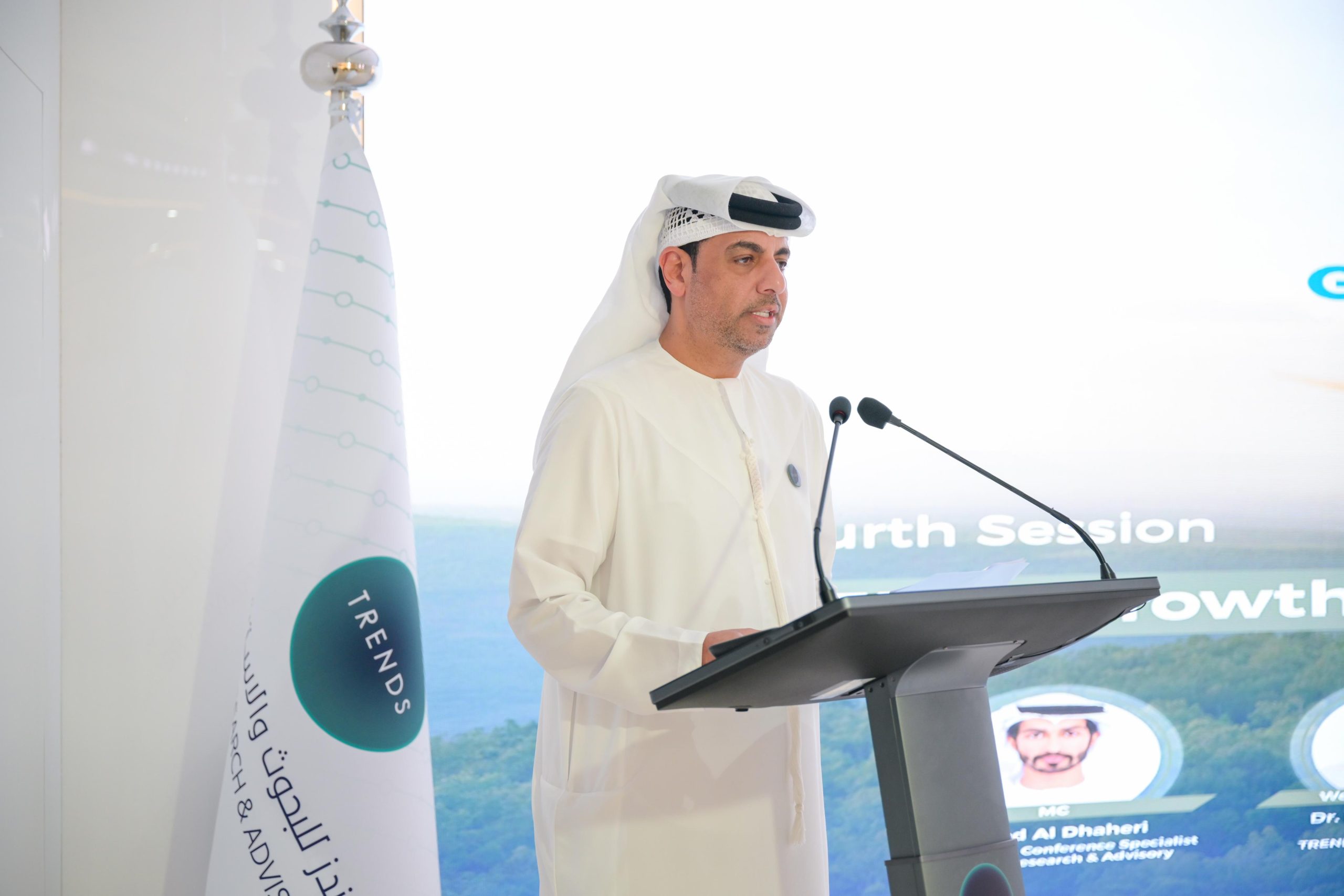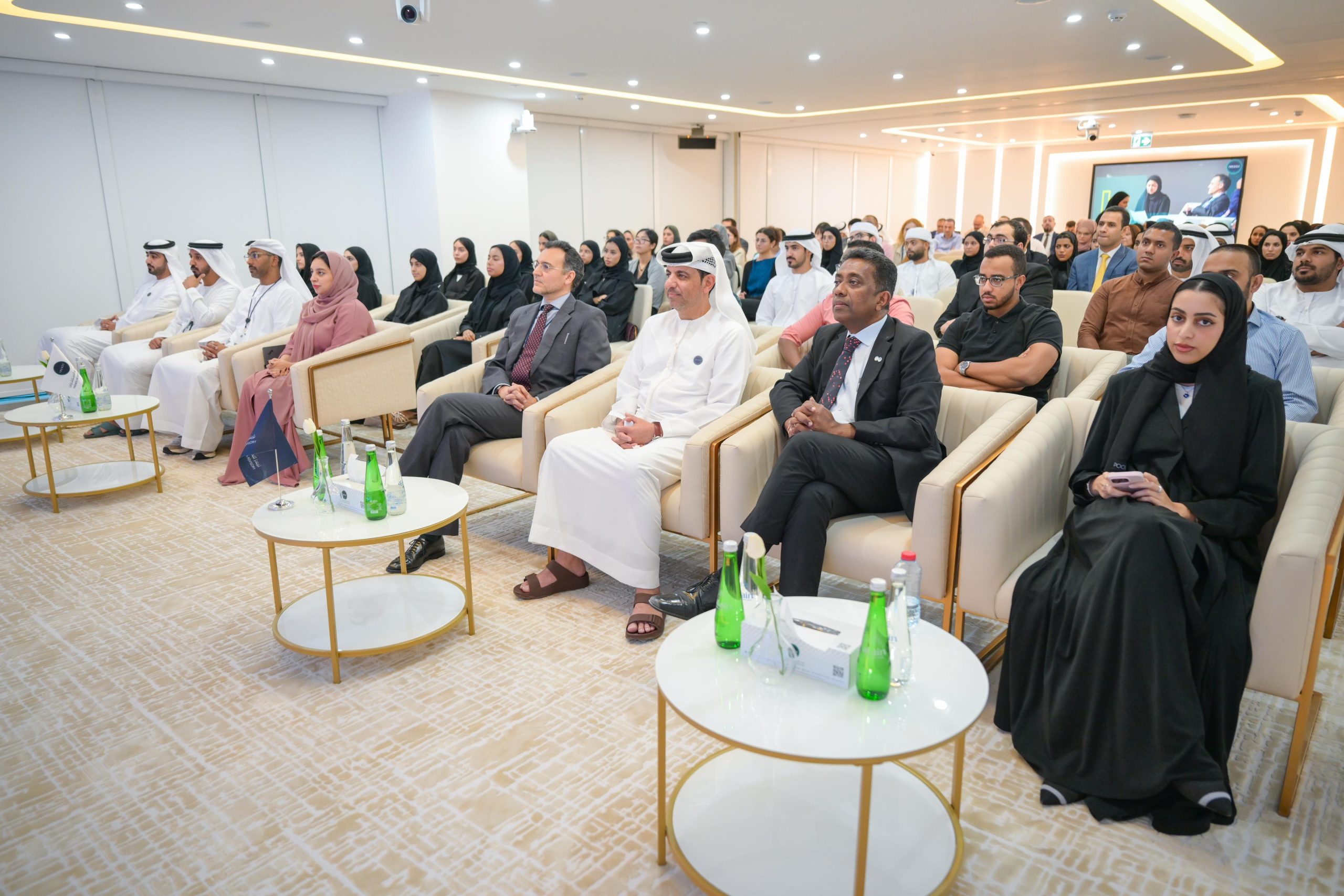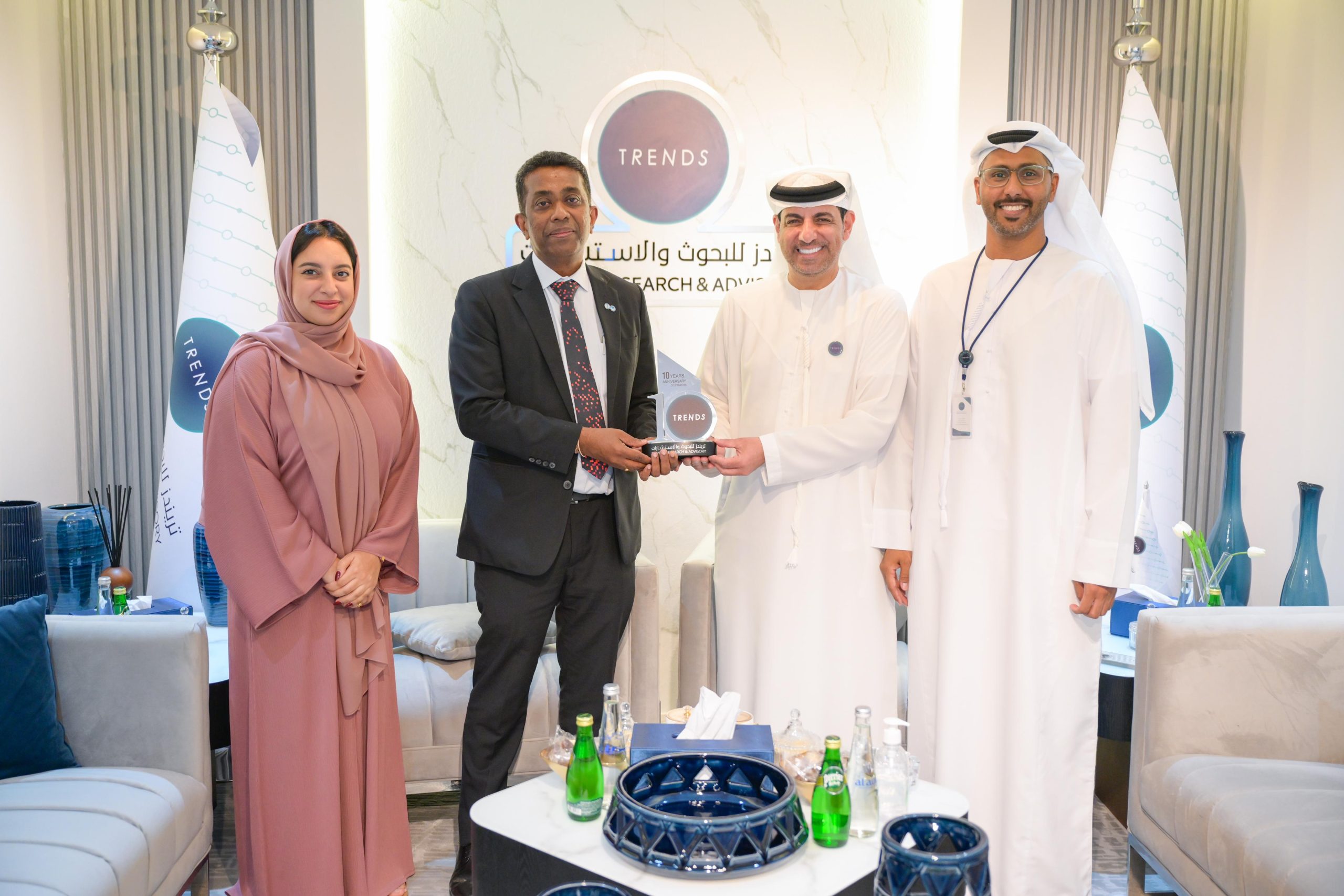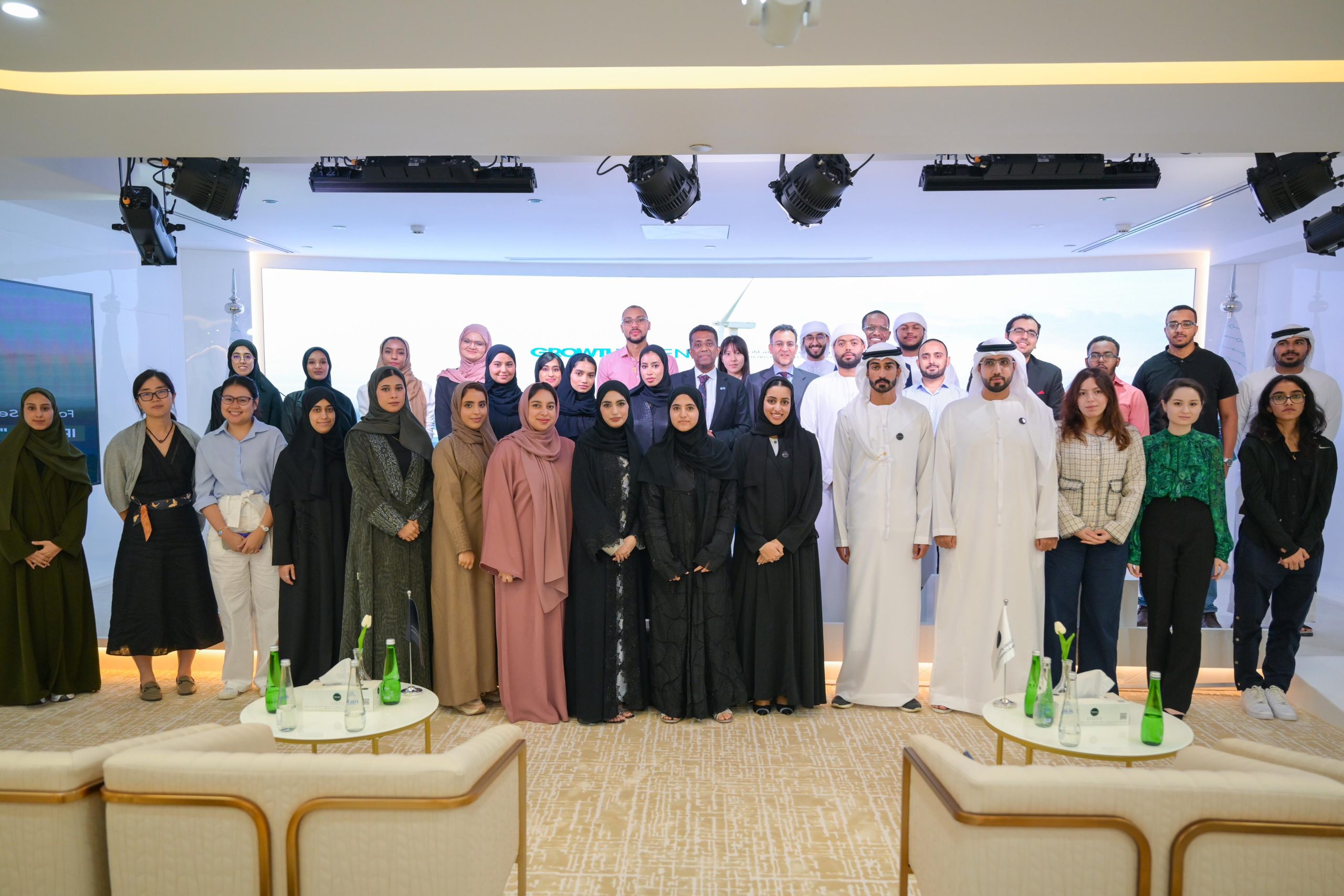In line with its global research vision and collaboration with specialized international sustainability institutions, TRENDS Research and Advisory hosted the fourth session of the IRENA Growth Program 2024 on Tuesday. The session saw participation from TRENDS researchers as well as experts and officials from IRENA, who discussed various renewable energy issues from a research perspective.
The IRENA Growth Program 2024 consists of five sessions aimed at equipping the next generation of energy specialists with the essential skills and knowledge needed to tackle current and future challenges in the energy sector. Enrollment and attendance for these sessions are open to those interested in benefiting from them.
The fourth session, held at TRENDS’ Conference Hall in Abu Dhabi and moderated by Najla Al-Zarouni, Director of Country Engagement and Partnerships at IRENA, featured three research papers and presentations of three graduation projects. These covered critical issues in the energy transition and the challenges it faces.
The significant role of think tanks
In his welcome address, Dr. Mohammed Abdullah Al-Ali, CEO of TRENDS Research and Advisory, emphasized the importance of the IRENA Growth Program in equipping the next generation of energy specialists with the necessary skills and knowledge to address the growing challenges in the energy sector, especially in light of global climate changes.
Dr. Al-Ali welcomed the participants in this event, which represents another fruitful outcome of ongoing and close cooperation with international institutions concerned with sustainability to support research efforts in this field.
He highlighted the vital role that think tanks play in addressing global economic challenges, noting that TRENDS places significant importance on climate issues and seeks to provide innovative economic insights to support climate action, relying on its outstanding researchers.
Dr. Al-Ali expressed his optimism about the future of international climate action, stressing that the discussions during the session would contribute to finding innovative solutions to the challenges facing the energy sector.
 Enhancing renewable energy knowledge
Najla Al-Zarouni stated that the IRENA Growth Program aims to enhance knowledge of renewable energy, the energy transition, and to provide participants with a deep understanding of renewable energy technologies and their applications by analyzing energy data to identify global and national trends in the renewable energy sector.
She mentioned that the program focuses on building a deep understanding of the energy transition, climate action, and sustainable development, emphasizing the importance of international cooperation to achieve a successful energy transition. The program also aims to build a strong network to promote the message of renewable energy and sustainability globally.
IRENA’s vital role
Binu Pathan, Deputy Director, Country Engagement and Partnerships at IRENA, presented IRENA’s role in promoting regional and national cooperation in renewable energy, emphasizing the agency’s vital role in accelerating the global transition to renewable energy. He stated that IRENA plays a vital role in shaping the future of global energy.
Pathan stressed the importance of regional and international cooperation to achieve this goal. He noted that COP28, hosted by the UAE, achieved a significant milestone by agreeing on ambitious goals to increase renewable energy and improve energy efficiency. This agreement reflects the global trend towards reducing reliance on fossil fuels and limiting greenhouse gas emissions. He also mentioned that IRENA has established six main pathways to achieve the goal of keeping global warming at 1.5 degrees.
Pathan highlighted that the transition to renewable energy has become both inevitable and economically viable, as renewable sources have become less expensive than fossil fuels. He pointed out that IRENA’s initiatives aim to support countries in this transition by providing the necessary technical and technological support, covering various aspects of the transition process, from initial assessment to project implementation and capacity building. He expressed his optimism about achieving a sustainable future based on renewable energy, noting the vital role that IRENA and other international institutions play in this regard.
Enhancing renewable energy knowledge
Najla Al-Zarouni stated that the IRENA Growth Program aims to enhance knowledge of renewable energy, the energy transition, and to provide participants with a deep understanding of renewable energy technologies and their applications by analyzing energy data to identify global and national trends in the renewable energy sector.
She mentioned that the program focuses on building a deep understanding of the energy transition, climate action, and sustainable development, emphasizing the importance of international cooperation to achieve a successful energy transition. The program also aims to build a strong network to promote the message of renewable energy and sustainability globally.
IRENA’s vital role
Binu Pathan, Deputy Director, Country Engagement and Partnerships at IRENA, presented IRENA’s role in promoting regional and national cooperation in renewable energy, emphasizing the agency’s vital role in accelerating the global transition to renewable energy. He stated that IRENA plays a vital role in shaping the future of global energy.
Pathan stressed the importance of regional and international cooperation to achieve this goal. He noted that COP28, hosted by the UAE, achieved a significant milestone by agreeing on ambitious goals to increase renewable energy and improve energy efficiency. This agreement reflects the global trend towards reducing reliance on fossil fuels and limiting greenhouse gas emissions. He also mentioned that IRENA has established six main pathways to achieve the goal of keeping global warming at 1.5 degrees.
Pathan highlighted that the transition to renewable energy has become both inevitable and economically viable, as renewable sources have become less expensive than fossil fuels. He pointed out that IRENA’s initiatives aim to support countries in this transition by providing the necessary technical and technological support, covering various aspects of the transition process, from initial assessment to project implementation and capacity building. He expressed his optimism about achieving a sustainable future based on renewable energy, noting the vital role that IRENA and other international institutions play in this regard.
 Critical minerals
Meanwhile, TRENDS researcher Najla Al-Midfa mentioned that international reports confirm that the global energy transition heavily relies on securing adequate supplies of critical minerals, which form the backbone of renewable energy technologies and a low-carbon economy.
She explained that these reports warned that the shift from a fuel-based energy system to a mineral-based one would lead to an unprecedented increase in demand for these minerals, making supply chain resilience a crucial factor for the success of the global energy transition.
Al-Midfa emphasized the importance of international cooperation to ensure global sharing of the benefits of the energy transition, as unilateral policies are incapable of securing the critical minerals necessary for a sustainable, low-carbon future.
Enhancing the energy transition
In his paper presented at the fourth session of the IRENA Growth Program 2024, Stephen Scalet, Advisor, TRENDS Global Sector, stated that the energy transition has become a means to enhance countries’ contributions to mitigating the effects of climate change. He explained that the success of this transition is measured by reducing emissions and decreasing carbon dependence until achieving national carbon neutrality goals.
Scalet noted that the energy transition for Middle Eastern countries and the Global South offers the opportunity to transition towards new business models and sources of economic growth, such as green manufacturing, electric transportation, advanced agriculture, and other climate-related economic sectors.
He added that although achieving carbon neutrality requires investments estimated at about three trillion dollars annually, continued political support and an increasing number of renewable energy projects in operation or advanced planning stages indicate an accelerating pace of global emission reduction.
Critical minerals
Meanwhile, TRENDS researcher Najla Al-Midfa mentioned that international reports confirm that the global energy transition heavily relies on securing adequate supplies of critical minerals, which form the backbone of renewable energy technologies and a low-carbon economy.
She explained that these reports warned that the shift from a fuel-based energy system to a mineral-based one would lead to an unprecedented increase in demand for these minerals, making supply chain resilience a crucial factor for the success of the global energy transition.
Al-Midfa emphasized the importance of international cooperation to ensure global sharing of the benefits of the energy transition, as unilateral policies are incapable of securing the critical minerals necessary for a sustainable, low-carbon future.
Enhancing the energy transition
In his paper presented at the fourth session of the IRENA Growth Program 2024, Stephen Scalet, Advisor, TRENDS Global Sector, stated that the energy transition has become a means to enhance countries’ contributions to mitigating the effects of climate change. He explained that the success of this transition is measured by reducing emissions and decreasing carbon dependence until achieving national carbon neutrality goals.
Scalet noted that the energy transition for Middle Eastern countries and the Global South offers the opportunity to transition towards new business models and sources of economic growth, such as green manufacturing, electric transportation, advanced agriculture, and other climate-related economic sectors.
He added that although achieving carbon neutrality requires investments estimated at about three trillion dollars annually, continued political support and an increasing number of renewable energy projects in operation or advanced planning stages indicate an accelerating pace of global emission reduction.

 Enhancing renewable energy knowledge
Najla Al-Zarouni stated that the IRENA Growth Program aims to enhance knowledge of renewable energy, the energy transition, and to provide participants with a deep understanding of renewable energy technologies and their applications by analyzing energy data to identify global and national trends in the renewable energy sector.
She mentioned that the program focuses on building a deep understanding of the energy transition, climate action, and sustainable development, emphasizing the importance of international cooperation to achieve a successful energy transition. The program also aims to build a strong network to promote the message of renewable energy and sustainability globally.
IRENA’s vital role
Binu Pathan, Deputy Director, Country Engagement and Partnerships at IRENA, presented IRENA’s role in promoting regional and national cooperation in renewable energy, emphasizing the agency’s vital role in accelerating the global transition to renewable energy. He stated that IRENA plays a vital role in shaping the future of global energy.
Pathan stressed the importance of regional and international cooperation to achieve this goal. He noted that COP28, hosted by the UAE, achieved a significant milestone by agreeing on ambitious goals to increase renewable energy and improve energy efficiency. This agreement reflects the global trend towards reducing reliance on fossil fuels and limiting greenhouse gas emissions. He also mentioned that IRENA has established six main pathways to achieve the goal of keeping global warming at 1.5 degrees.
Pathan highlighted that the transition to renewable energy has become both inevitable and economically viable, as renewable sources have become less expensive than fossil fuels. He pointed out that IRENA’s initiatives aim to support countries in this transition by providing the necessary technical and technological support, covering various aspects of the transition process, from initial assessment to project implementation and capacity building. He expressed his optimism about achieving a sustainable future based on renewable energy, noting the vital role that IRENA and other international institutions play in this regard.
Enhancing renewable energy knowledge
Najla Al-Zarouni stated that the IRENA Growth Program aims to enhance knowledge of renewable energy, the energy transition, and to provide participants with a deep understanding of renewable energy technologies and their applications by analyzing energy data to identify global and national trends in the renewable energy sector.
She mentioned that the program focuses on building a deep understanding of the energy transition, climate action, and sustainable development, emphasizing the importance of international cooperation to achieve a successful energy transition. The program also aims to build a strong network to promote the message of renewable energy and sustainability globally.
IRENA’s vital role
Binu Pathan, Deputy Director, Country Engagement and Partnerships at IRENA, presented IRENA’s role in promoting regional and national cooperation in renewable energy, emphasizing the agency’s vital role in accelerating the global transition to renewable energy. He stated that IRENA plays a vital role in shaping the future of global energy.
Pathan stressed the importance of regional and international cooperation to achieve this goal. He noted that COP28, hosted by the UAE, achieved a significant milestone by agreeing on ambitious goals to increase renewable energy and improve energy efficiency. This agreement reflects the global trend towards reducing reliance on fossil fuels and limiting greenhouse gas emissions. He also mentioned that IRENA has established six main pathways to achieve the goal of keeping global warming at 1.5 degrees.
Pathan highlighted that the transition to renewable energy has become both inevitable and economically viable, as renewable sources have become less expensive than fossil fuels. He pointed out that IRENA’s initiatives aim to support countries in this transition by providing the necessary technical and technological support, covering various aspects of the transition process, from initial assessment to project implementation and capacity building. He expressed his optimism about achieving a sustainable future based on renewable energy, noting the vital role that IRENA and other international institutions play in this regard.
 Critical minerals
Meanwhile, TRENDS researcher Najla Al-Midfa mentioned that international reports confirm that the global energy transition heavily relies on securing adequate supplies of critical minerals, which form the backbone of renewable energy technologies and a low-carbon economy.
She explained that these reports warned that the shift from a fuel-based energy system to a mineral-based one would lead to an unprecedented increase in demand for these minerals, making supply chain resilience a crucial factor for the success of the global energy transition.
Al-Midfa emphasized the importance of international cooperation to ensure global sharing of the benefits of the energy transition, as unilateral policies are incapable of securing the critical minerals necessary for a sustainable, low-carbon future.
Enhancing the energy transition
In his paper presented at the fourth session of the IRENA Growth Program 2024, Stephen Scalet, Advisor, TRENDS Global Sector, stated that the energy transition has become a means to enhance countries’ contributions to mitigating the effects of climate change. He explained that the success of this transition is measured by reducing emissions and decreasing carbon dependence until achieving national carbon neutrality goals.
Scalet noted that the energy transition for Middle Eastern countries and the Global South offers the opportunity to transition towards new business models and sources of economic growth, such as green manufacturing, electric transportation, advanced agriculture, and other climate-related economic sectors.
He added that although achieving carbon neutrality requires investments estimated at about three trillion dollars annually, continued political support and an increasing number of renewable energy projects in operation or advanced planning stages indicate an accelerating pace of global emission reduction.
Critical minerals
Meanwhile, TRENDS researcher Najla Al-Midfa mentioned that international reports confirm that the global energy transition heavily relies on securing adequate supplies of critical minerals, which form the backbone of renewable energy technologies and a low-carbon economy.
She explained that these reports warned that the shift from a fuel-based energy system to a mineral-based one would lead to an unprecedented increase in demand for these minerals, making supply chain resilience a crucial factor for the success of the global energy transition.
Al-Midfa emphasized the importance of international cooperation to ensure global sharing of the benefits of the energy transition, as unilateral policies are incapable of securing the critical minerals necessary for a sustainable, low-carbon future.
Enhancing the energy transition
In his paper presented at the fourth session of the IRENA Growth Program 2024, Stephen Scalet, Advisor, TRENDS Global Sector, stated that the energy transition has become a means to enhance countries’ contributions to mitigating the effects of climate change. He explained that the success of this transition is measured by reducing emissions and decreasing carbon dependence until achieving national carbon neutrality goals.
Scalet noted that the energy transition for Middle Eastern countries and the Global South offers the opportunity to transition towards new business models and sources of economic growth, such as green manufacturing, electric transportation, advanced agriculture, and other climate-related economic sectors.
He added that although achieving carbon neutrality requires investments estimated at about three trillion dollars annually, continued political support and an increasing number of renewable energy projects in operation or advanced planning stages indicate an accelerating pace of global emission reduction.




